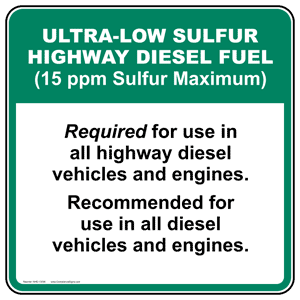
Diesel Fuel 101
Ultra-low sulfur diesel (ULSD) fuel was required by EPA as the new standard for the sulfur content in on-road diesel fuel sold in the United States starting in late 2006. The allowable sulfur content for ULSD (15 ppm) is much lower than the previous U.S. on-highway standard for low sulfur diesel (LSD, 500 ppm) and considerbly lower than the 5000 ppm of sulfur that was present in fuel prior to October of 1993.
The process used to reduce the sulfur also reduces the fuel's lubricating properties. Lubricity is a measure of the fuel's ability to lubricate and protect the various parts of the engine's fuel injection system from wear. The processing required to reduce sulfur to 15 ppm also removes naturally-occurring lubricity agents in diesel fuel. In practice most fuel is closer to 5 ppm as refiners try to keep costs down as much as possible.
This has led to a fuel that is much drier and, along with loss of lubricity, it has also decreased cold weather protection, increased the amount of water in diesel fuel (leading to a improved algae environment) and has decreased the shelf life dramtically (in some cases fuel begins to degrade in as little as 28 days). Due to it's lower cold weather protection more operators have had to use #1 diesel to keep equipment running which has made a bad situation even worse since #1 diesel is even drier than ULSD #2 diesel fuel. CleanFire gives you the advantage of keeping the power, performance and operability you are accustomed to when running #2 diesel, but with the cold weather protection of #1---all at a lower price due to the reduced amount of #1 you will have to run.


Add to this that some refiners add in additives and some do not so that they can keep their costs as low as possible and you end up with a perfect storm of problems when it comes to using a consistent blend of diesel fuel that works as it should.
We encourage you to click on the Benefits and Learn More tabs to see how CleanFire can address the problems described above. For more information feel free to visit the follow site: https://www.thoughtco.com/diesel-and-biodiesel-vehicles-cold-weather-85676

